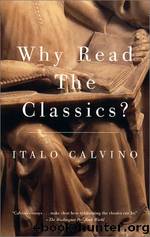Italo Calvino by Why Read the Classics

Author:Why Read the Classics
Language: eng
Format: mobi
Published: 2012-01-09T09:26:13+00:00
* * *
never tired of believing (though he was also able to discern less obvious things in Italians: their lack of confidence, their anxiety, their caution).
Whatever the original source of inspiration, the opening of the novel contains such autonomous drive that it could easily continue under its own steam, ignoring the Renaissance chronicle. Instead, Stendhal goes back to it every so often and resorts to Farnese again as his model. The most incongruous result of following this source is that as soon as Fabrizio removes his Napoleonic soldierâs uniform, he enters a seminary and takes his vows. For the rest of the novel we have to imagine him dressed as a monsignor, a rather uncomfortable notion both for him and for us, because we need to make a considerable effort to reconcile the two images, and his ecclesiastical condition impinges only on his external behaviour and not at all on his spirit.
Already some years previously another Stendhalian hero, he too a young man thirsty for Napoleonic glory, had decided to don the cassock, seeing that the Restoration had blocked a military career to all except the scions of the nobility. But in The Red and the Black, Julien Sorelâs alternative vocation is the novelâs central theme, a situation with much more serious and dramatic consequences for Julien than for Fabrizio del Dongo. Fabrizio is not Julien inasmuch as he lacks his psychological complexity, but nor is he Alessandro Farnese who was destined to end up as Pope, and as such is the emblematic hero of a tale which can be interpreted as much as a scandalous anticlerical revelation as an edifying legend about a sinnerâs redemption. Well then, who is Fabrizio? Leaving aside the clothes he wears and the events in which he lets himself become embroiled, Fabrizio is someone who tries to read the signs of his destiny, guided by the science that he has been taught by the abbé-astrologer Blanès, his real teacher. He asks himself about the future and the past (was Waterloo his battle or not?), but his whole reality is in the present, moment by moment.
Like Fabrizio, the whole of The Charterhouse overcomes the contradictions of its composite nature thanks to constant motion. When Fabrizio ends up in prison, a new novel opens up within the novel: the novel about the prison, the tower and his love for Clelia, which is something completely different from the rest of the book, and even more difficult to define.
There is no human condition more anguished than that of the prisoner, but Stendhal is so refractory to anguish that even when he has to represent isolation in a cell inside a tower (after an arrest in mysterious and distressing
Download
This site does not store any files on its server. We only index and link to content provided by other sites. Please contact the content providers to delete copyright contents if any and email us, we'll remove relevant links or contents immediately.
Fury of Magnus by Graham McNeill(2090)
The Fine Print (Dreamland Billionaires Book 1) by Lauren Asher(1867)
The Rose Code by Kate Quinn(1620)
The Last House on Needless Street by Catriona Ward(1588)
Luster by Raven Leilani(1579)
Transcendent Kingdom by Yaa Gyasi(1569)
Moonflower Murders by Anthony Horowitz(1420)
Malibu Rising by Taylor Jenkins Reid(1374)
This Changes Everything by Unknown(1187)
The Lying Life of Adults by Elena Ferrante(1170)
The Lost Book of the White (The Eldest Curses) by Cassandra Clare & Wesley Chu(1156)
The Midwife Murders by James Patterson & Richard Dilallo(1151)
The New Wilderness by Diane Cook(1123)
Written in the Stars by Alexandria Bellefleur(1097)
Ambition and Desire: The Dangerous Life of Josephine Bonaparte by Kate Williams(1087)
The Kindest Lie by Nancy Johnson(1086)
The Lying Life of Adults by Elena Ferrante;(1054)
Every Vow You Break by Swanson Peter(1043)
Wandering in Strange Lands by Morgan Jerkins(1017)
